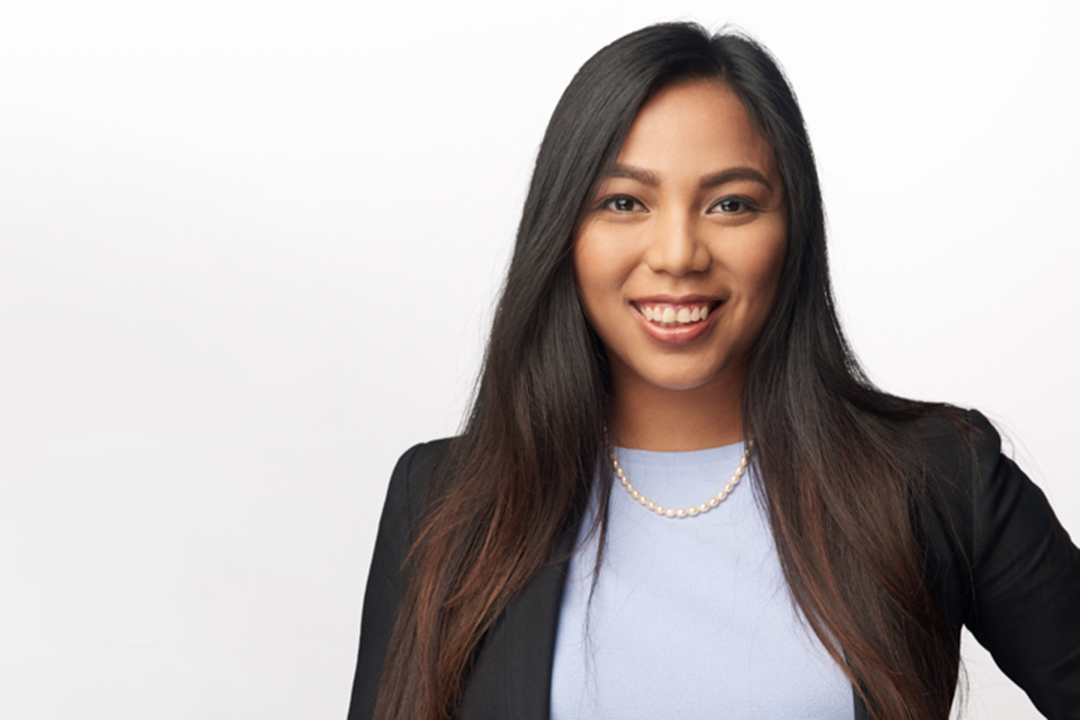Gisela Perez Kusakawa, JD '18, was awarded the National Asian Pacific American Bar Association (NAPABA) Law Foundation Community Law Fellowship to work with Asian Americans Advancing Justice | AAJC (Advancing Justice | AAJC) on a two-year project.
The NAPABA Law Foundation Community Law Fellowship seeks to develop the public interest law leaders of the future, whether they continue to work in the nonprofit arena or become pro bono advocates in the private bar.
“Ms. Kusakawa has demonstrated a deep commitment to serving immigrants within the Asian American and Pacific Islander (AAPI) community,” said John C. Yang, JD '92, president and executive director of Advancing Justice | AAJC. “Already a leader among Asian American students, we look forward to her work in fighting for the rights of Asian American immigrant communities and becoming a future leader in the AAPI legal community."
Having previously interned with Advancing Justice | AAJC during her 1L and 2L years, Ms. Kusakawa said it was a natural choice to work with the organization again for her NAPABA Law Foundation Community Law Fellowship.
"When you have the occasion to work for an organization the caliber of Advancing Justice | AAJC, you savor it and look for more opportunities to establish a deeper, more meaningful chance to serve the Asian American community," Ms. Kusakawa said. "I feel incredibly privileged to be able to work to protect and advance the rights of AAPIs and immigrants, and I am grateful to the NAPABA Law Foundation for the opportunity to serve the community through this fellowship."
Ms. Kusakawa's project looks to challenge the ongoing criminalization of Asian immigrants across all sectors of the United States. She specifically will address the government’s xenophobic scrutiny targeting Chinese and Chinese American students, scholars, and professionals; the dramatic increase in immigration enforcement against Southeast Asian refugee communities; and the targeting of Muslim and South Asian communities in a climate of ongoing Islamophobia.
To accomplish this, she is working with policymakers and the AAPI community to educate both stakeholders in the needs of Asian American citizens and immigrants.
Originally from Tondo, Manila, Ms. Kusakawa immigrated to the United States when she was a young girl.
"If I hadn't moved to the US, I would have found myself trapped in the same cycle of poverty and violence that many relatives still live through. No matter how smart you are or how much you hustle for a better life, things are hard to change if your country is in political, economic, and social turmoil," she said.
That cycle is not magically broken once a family or individual immigrates, though. "People don't often move because it was a choice. They move out of love and hope. There is still intergenerational trauma that comes from generational poverty," Ms. Kusakawa said. "Knowing the trajectory of my life was changed by immigrating to the United States, I very much understand what makes so many immigrants strive to come to this country," she said.
Ms. Kusakawa's personal experience with immigration is what fuels her desire to use her legal background to make a positive impact on vulnerable communities both domestically and in the international sphere.
"I simply want things to get better for them and their families," Ms. Kusakawa said. "I hope we can come to a place in our immigration system where we can look at people with compassion."
During her time at GW Law, she was President of the Asian Pacific Law Student Association and President of the International Law Society. She also worked at the Immigration Clinic, where she helped a mother and daughter receive a grant of asylum in the United States.
"I wanted to go to school at GW Law to be in a place where I could help people who just want a better life and need compassion above all things," Ms. Kusakawa said. "Working in the Immigration Clinic made me realize I made the right choice to come to GW Law."
Ms. Kusakawa said she was able to succeed in her endeavors at the Immigration Clinic and at GW Law due to the great mentorship and guidance she received from GW Law staff such as Professorial Lecturer in Law and Interim Director of the Immigration Clinic Paulina Vera, Director of the Immigration Clinic and Professor of Law Alberto M. Benitez, Professorial Lecturer in Law and Judge Kuyomars Golparvar, former Professorial Lecturer in Law Jason Dzubow, and Professor of Law Cynthia Lee.
Even after law school, she continued to be mentored by GW Law alumni, having clerked under trailblazer, the Honorable John M. Tran, JD '84, who is considered to be the first Asian American judge in Virginia. She expressed gratitude to GW Law staff and alumni for investing in her personal and professional growth while helping her pursue her passion in public interest.
Previously, Ms. Kusakawa served as an AmeriCorps member for a Cincinnati non-profit that addressed the educational, social, and financial needs of local immigrants. As an undergraduate student, she worked on business and job development in the rural villages of the Philippines through Save the Ifugao Terraces Movement (SITMo). She worked as a teacher in Ise City, Japan, through the JET Program during which she was also a disaster relief volunteer for the Tohoku earthquake and tsunami.
To learn more about Ms. Kusakawa's work with Advancing Justice | AAJC, visit advancingjustice-aajc.org.


